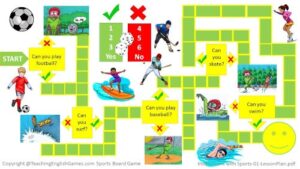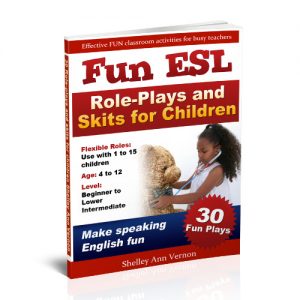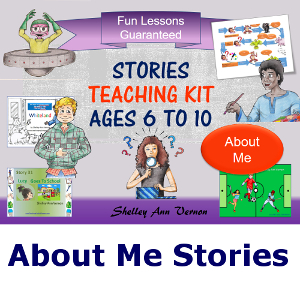How to help a middle school student learn English quickly
Here are some ideas for the challenge of teaching English for middle school children.
Here is a typical teaching problem
English for middle school case study:
A bright 11-year-old girl is studying English at middle school and has one private lesson per week. She picks everything up quickly and gets good marks in the tests at school. However, unfortunately, the next week, she has forgotten it all! Each week the private English teacher has to start again, and he thinks that this is because they only have one lesson a week. The teacher wants to make lessons fun. In addition, they would like to motivate their student to do some extra English outside of lesson time. For info, this particular student loves music, singing, drawing, and painting.
English for middle school solutions
In response, I will say that children can remember English learned from one week to the next, even if they only have a lesson for an hour. To achieve this, however, one needs to apply four principles:
1. Do not teach too much new language at a time.
A maximum of six new vocabulary words per lesson or one grammar point is enough.
2. Play revision games in every lesson
In every lesson, spend some time playing revision games that review everything learned so far. Revision games are those that quickly cover a wide range of vocabulary or language. For example, these could be card games that use flashcards, quiz games, brainstorming games, association games, memory games, or story games. All these types of games and plenty more are in 176 English Language Games for Children.
3. Make the language real by using it in context.
It would be ideal for this student to learn English through role-playing because vocabulary and grammar points come alive in natural dialogues. In addition, include props and actions. So, for example, they can prepare and perform skits. Then, finally, have a performance when the play is ready, and show it to parents, or film it. The situation, setting, actions, and frequent repetition through rehearsals mean that the language sticks. Therefore, pupils remember it easily from one week to the next. In fact, experience has shown me that they remember it for years!
You’ll find the perfect book of skits for middle school students below:
Skits for Children Paperback from Amazon
For A2 and B1 levels try these plays instead:
4. Exploit the student’s talents.
The more a student enjoys a lesson, the more motivated they will be. Using games and skits are ways to achieve this. In addition, play around with topics that are dear to the heart of your student. In the case of this particular 11-year-old, capitalize on the fact that she is musical. If you teach her English using her favourite songs, she will be singing along to them all week in between lessons. See the resources box below for a blog post all about using songs with pointers on how to go about it.
This particular middle school student also enjoys drawing and painting. Give her projects such as creating flashcards or cards for Happy Families and use them in lesson time. Then, get her to make a board game that you can play together in the next lesson. Board games can be tailored to whatever vocabulary or grammar you require.
Do share your English for middle school tips with us below. We would love to hear from you! Also, if you need more help with English for middle school – please just ask! I’m here to help.
The picture shows one from my series of “About Me” stories. Great board games can be made on the back of a cereal packet, or by sticking white paper onto a cardboard box.

Resources for middle school pupils
176 English Language Games for Children. Instant download – Paperback
Fun ESL Role-Plays and Skits for Children. Instant download – Paperback
About Me stories, including illustrated stories, lesson plans with games, flashcards, worksheets and board games. Instant download. Also PowerPoint and movie version by native speakers.
Blog post on teaching English with songs: Getting teens learning English through songs
-
ESL Tutoring
Fun ESL Role-plays and Skits for Children
Rated 0 out of 5€19.97Original price was: €19.97.€15.33Current price is: €15.33. Add to cart -
Games
ESL Games book for primary & middle school children
Rated 5.00 out of 5€19.97Original price was: €19.97.€15.33Current price is: €15.33. Add to cart -
Primary
About Me Stories Teaching Kit + PowerPoints
Rated 0 out of 5€49.97Original price was: €49.97.€33.97Current price is: €33.97. Add to cart




4 thoughts on “English for middle school”
Thanks so much for these ideas.
Very interesting and helpful! Our school year is about to start …. and for sure I am going to put some of these ideas into practise …. I like lively lessons and help those students who have a different rhythm of learning …. Thank you very much.
Xo Xo
My concern is that with one lesson a week, learning a maximum of either 6 new words OR one new grammar point, achieving fluency is going to take a very long time. I’m all for role plays and skits, but I think that a lot of games don’t really pay off in terms of how much a child learns in the time spent. Do you think this child would make faster progress if encouraged to watch children’s tv and read easy books with a parent, every day or two? Little and often…
Dear Lydia,
Hello – yes if a child only has one lesson a week then they will progress more slowly than if they have more! Absolutely, the more we use English, the faster we learn.
As for only teaching six new words per lesson – in the next lesson you will be teaching six new ones and revising the six from the previous lesson. By the fourth lesson you will be working with 24 words. These are only vocabulary words that you focus on – other words will be present in passing.
I personally have far better results teaching with games than with a textbook. The pupils I have made huge progress. I have taken on pupils who had been learning English in school for years and could not say anything except “my name is…” and a few colours. A pathetic result. Using games and skits my pupils have all started speaking English and enjoying the subject. My latest pupil was despondent and demotivated, far behind her classmates. Now she is loving English and getting top grades. So I firmly believe that using games gives pupils more chance to speak and participate actively. Sitting behind a textbook, or looking at the board, does not have the same effect.
Kind regards
Shelley Ann Vernon